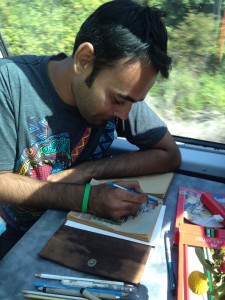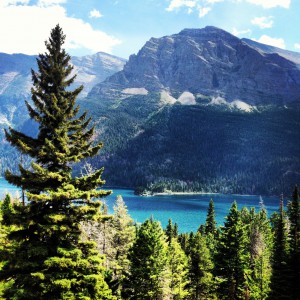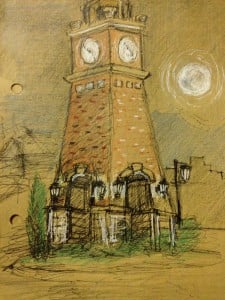In the words of Anser Shaukat, a Fulbright Foreign Student from Pakistan:
Our whitefish adventure began with us packing ourselves and our leather bag-packs in a rental car. Armed with nothing but traditional maps, we started heading towards the rocky blue horizon that seemed to be the permanent backdrop for the city of Whitefish.
The mountains in the distance reminded me of various swatches of blue paper cutouts meticulously selected and arranged along the horizon.
As we got closer, the colors changed from cerulean to red and viridian; a sight that could not be ignored by young smart phone-wielding Millennials. It was no wonder that our journey to the Glacier National Park took the pace of the glacier itself; slowly carving our way, through the lush pine, ridged rocks and silver rivers.
We stopped our cars immediately and frequently to immortalize our memories of the park’s grandeur in our phones whenever a breathtaking ravine would demand it of us and the hoard of visitors behind us would allow. It did not matter how many times we circled around the same rocky facade, the cameras would come out each time, as if the mountain was born anew. Each time we stopped, we would run across the highways avoiding incoming cars, Karachi-style, receiving shouts from the bikers along the way. We didn’t care, we were alive.
We finally made our way down the sun road arriving at sun spot, waving at the mountain goats along the way. Emerging ahead of us, from the emerald-sapphire waters was yet another mountain; its peak shimmering with the river under the August sun. While the adult that I am tried his hand at skipping stones with advanced techniques, the child in me was compelled to collect the red rocks and green stones from the river bed, which under the magic of the emerald waters had transformed into precious treasures.
I remember seeing snow then, clustered around the ridges of the icy blue mountains; the last remnant of a winter long gone in most of the country. Not unlike the drive-in theatre we passed on the long road back, with its giant white screen in the empty field, surrounded by the thriving farmlands. Or, the rail hoppers, who can be seen in Whitefish, wearing mismatched clothes and torn gloves; with giant backpacks swung across their backs and their faithful canine companion by their sides, looking for the next train they can call home.
While the sun was getting ready to call it a day in New England, Whitefish was still going about its day at glacier-pace. Locals and visitors alike enjoyed the Huckleberry Days’ Festival – from whistles made from antlers to saw carved beavers holding signs reading: “One damn project after another,” next to a sign reading, “We don’t give a huck,” were huckleberry jams made from the locally foraged infamous huckleberries. The festival seemed to symbolize the essence of Whitefish; that a small berry can have a big impact.
It was at the river on Baker Ave, where I was overcome with the urge to join the locals in a “Whitefish tradition.” From bridge diving to rodeos and free ranch egg hunts, my afternoon was filled with stories that could only be born in Whitefish.
Seeing a Whitefish local bathing with the ducks in the stream, I was filled with a longing for the Karachi beach. Ankle deep I started a count to three, which extended to the five of reluctance. I realized the only way was to hold my breath and dive right into the culture. As I emerged, 10 duck waddles later, I was hit by a sudden unfamiliarity. Having never swam in a river, I had jumped in, expecting the salty nostalgia of the Karachi beach, but emerged with river water freshness; an experience impossible in the urban landscape of New Bedford or Karachi.
On the way back to the Fulbright Millennial Train, I felt drawn to the towering facade of the clock tower in the center of downtown. Its bright white clock face synchronizing the entire town to its relaxed pace. In the quiet blanket of the night it seemed that I could almost hear the grinding of the individual parts working together, glowing with the spirit of Whitefish community.
One by one as the city lights went out all that remained save the deep darkness was the full moon, and the luminous face of the clock tower.





No Comments